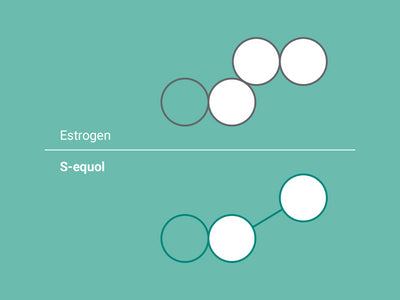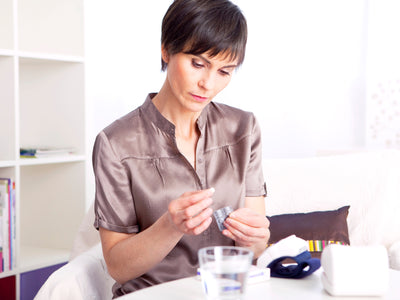
Life After Menopause: Postmenopause Symptoms & More
Postmenopause may feel like the longest period of a woman’s life but it seems so little time is given to discussing it. While the signs of menopause may include hot flashes, mood swings, sleep problems, and more—women often don’t experience a full reduction in the frequency and intensity of their postmenopause symptoms until many years after menopause. But this isn’t the case for everyone. A variety of factors can make it difficult to tell the difference between postmenopause and menopause. Listening to your body, however, is vital during all menopause stages, as this natural decline of estrogen can give rise to new health concerns. Besides, thriving during postmenopause begins with listening to what our bodies are trying to tell us and learning what the menopause symptoms and signs are, as you enter this new and exciting stage of life.
WHAT ARE THE SIGNS OF COMING TO THE END OF MENOPAUSE?
The first sign you’re coming to the end of menopause is that you’ve gone 12 consecutive months without your period.1 Your ovaries produce less progesterone, and then ultimately less estrogen in the years leading up to postmenopause, which can disrupt your menstrual cycle causing irregular periods before your cycle eventually stops entirely.1 Some women experience the ease of menopause symptoms such as hot flashes, mood swings, and sleep problems once they enter postmenopause.1 For other women, these trademark menopause symptoms continue well into the postmenopause years.1
HOW DO YOU KNOW IF YOU’RE ALREADY IN POSTMENOPAUSE?
If you’ve gone 12 months without a period, you have most likely entered the postmenopause phase.1 Some medical conditions or procedures, as well as various medications, can affect your menstrual cycle and complicate knowing exactly where you are in this process.1 The best way to tell if you’re in postmenopause is to know when your last menstrual cycle was, and have your doctor test your hormone levels. Once you’ve passed the day that marks one full year since your last period (barring other medications or medical conditions), you’ve entered postmenopause.
WHEN DOES POSTMENOPAUSE START?
Postmenopause begins the day after you hit menopause, and lasts for the rest of a woman’s life.1 Menopause is the one day marking a full 12 months without your period.1 Women in the US reach menopause on average by age 51, and every day after that is considered to be postmenopause.2
There are a few key factors which contribute to earlier menopause, and therefore an earlier postmenopause:3
- If your mother entered menopause earlier, chances are you will too
- Smoking can cause menopause to occur earlier in life
- Chemotherapy and other medical procedures can induce an early menopause
- An elevated body mass, or obesity, can cause menopause to occur earlier
It’s important to keep track of your menstrual cycle in the early stages of this transition for a few reasons. For one, it’ll be easier to have conversations with your doctor about your health because you’ll have a better idea of when you entered postmenopause. Another reason to track your menstrual cycle is that it’s still possible to get pregnant until you hit postmenopause.1
9 Facts You Didn’t Know About Menopause and Pregnancy
WHEN TO SEE YOUR DOCTOR ABOUT POSTMENOPAUSE
It’s important to continue regular visits with your doctor even during postmenopause. For example, if you are experiencing vaginal bleeding after menopause, it could indicate a serious medical issue.2 Because estrogen is such a powerful hormone, there are many other health concerns that may arise as our bodies adjust to life without estrogen as well.
Some important conversations to continue with your doctor during postmenopause include:
- Cancer screenings: Women ages 50–74 with an average risk of breast cancer benefit from screenings at least every other year.4 Cervical cancer screenings can occur less frequently but are recommended as well at 3- to 5-year intervals.4
- Sexually transmitted infections: If you’re sexually active, it’s important to continue STI screenings even after menopause.4
- Depression: It’s recommended that postmenopausal women be routinely screened for depression, alcohol abuse, and intimate partner violence.4
- Disruptive symptoms: Some menopause symptoms may continue or grow worse after menopause. Talk to your doctor if you experience hot flashes exclusively at night, sudden weight gain or loss, abdominal pain, swelling, or tenderness—as these may be symptoms of a more serious condition.4
- Preventative care: Keeping in touch with your doctor for regular preventative screenings is a great way to stay on top of your health during postmenopause. Keep up your physical exams, mole checks, colonoscopies, bone density screenings, and even your teeth and gum care.
OTHER HEALTH CONDITIONS TO BE AWARE OF DURING POSTMENOPAUSE
While postmenopause opens the door to an exciting new era of life, it can present some new health challenges as well. It’s important to stay in tune with your body and with your doctor during this time, especially if you have a history of other health conditions that may be exacerbated by this loss of estrogen.
A few health changes to take special note of during this time include:
- Heart health. Estrogen and the heart. Cardiovascular disease is the leading cause of death and disability in postmenopausal women over age 50.4
- Bone health: There’s a direct relationship between estrogen loss and bone loss.2 Postmenopausal women are more likely to develop osteoporosis, which causes the bones to become weak and brittle.2
- Urinary health: Lower levels of estrogen may affect urinary tract health, which may be weak already due to childbirth and the natural aging process.2 This can increase the risk of bladder leakage, UTIs, or other urogynecological problems.2
- Weight gain: Producing less estrogen may also lower how quickly your body metabolizes certain foods, which can prompt the body to store fat instead of burning it.2 Weight gain can also occur with age due to decreased physical activity.2
- Sexuality and libido: Estrogen helps keep vaginal walls lubricated.2 After estrogen production stops, vaginal tissues can become thin and more easily irritated during sex.2 This can cause urinary tract infections or vaginal atrophy, all of which can make sex less enjoyable and contribute to a lowered libido.2
HOW CAN I ADDRESS MY POSTMENOPAUSE SYMPTOMS?
While many women experience a decreased frequency and intensity of menopause symptoms in the years following menopause, this isn’t the case for everyone. In addition to taking menopause supplements, here are some ways to help ease the symptoms you may feel during postmenopause:
- Exercise: Exercise can help stimulate heart and bone health, while also helping to maintain a healthy weight.2
- Diet: Can also help manage a healthy weight, as well as ensure you’re consuming a variety of nutrients needed throughout life.2
- Calcium and vitamin D supplements: For bone health support.2
- Hormone therapy: While not right for everyone, hormone therapy replacement can help reduce hot flashes and vaginal dryness.2
- Vaginal lubricants: Try experimenting with various lubricants to help increase comfort and enjoyment during sex.2
WHEN DOES POSTMENOPAUSE END?
Postmenopause is the final stage of a woman’s reproductive life. But it’s also the beginning of a new era free from cramps, bleeding, and other unpleasant menstrual side effects so many women have come to live with and expect. Menstrual cycles stop, as does ovarian estrogen production. Women can no longer get pregnant after menopause, sex can be enjoyed freely, although STIs are still a concern for postmenopause women who are sexually active.
LOOKING FORWARD TO LIFE AFTER MENOPAUSE
It may seem strange at first to adjust to years free from sporadic cramps, bleeding, bloating, and host of other uncomfortable symptoms of menstruation—but postmenopause is an era in which many women find themselves feeling liberated and flourishing exactly for those reasons. While it’s crucial to continue keeping an eye on your health, and meeting with your doctor regularly, this time can be one of immense growth and self-reflection. Tending to our overall health during postmenopause can help it feel as though our best years are truly before us.
References
- Cleveland Clinic. “Menopause, Perimenopause, and Postmenopause.” 2019. Accessed on: June 19, 2020. https://my.clevelandclinic.org/health/diseases/15224-menopause-perimenopause-and-postmenopause
- University of Utah. “Postmenopause.” Accessed on: June 19, 2020. https://healthcare.utah.edu/womenshealth/gynecology/menopause/postmenopause.php
- Bae H, Lunetta KL, Murabito JM, Andersen SL, Schupf N, Perls T, Sebastiani P; Long Life Family Study. Genetic associations with age of menopause in familial longevity. Menopause. 2019 Jun 10. doi: 10.1097/GME.0000000000001367. [Epub ahead of print]
- Baill IC, Castiglioni A. Health Maintenance in Postmenopausal Women. Am Fam Physician. 2017;95(9):561-570. https://www.aafp.org/afp/2017/0501/p561.html


